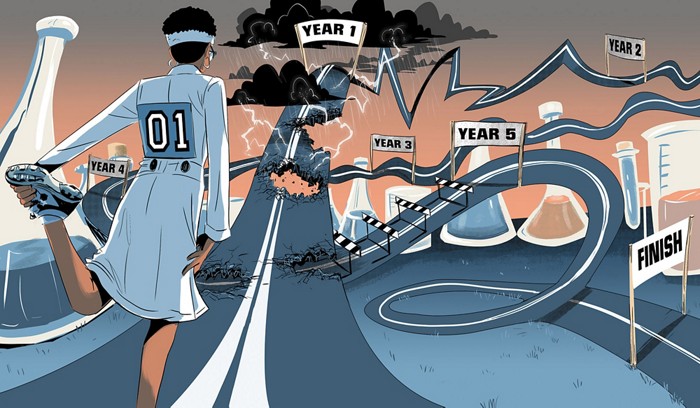Advertisement
Grab your lab coat. Let's get started
Welcome!
Welcome!
Create an account below to get 6 C&EN articles per month, receive newsletters and more - all free.
It seems this is your first time logging in online. Please enter the following information to continue.
As an ACS member you automatically get access to this site. All we need is few more details to create your reading experience.
Not you? Sign in with a different account.
Not you? Sign in with a different account.
ERROR 1
ERROR 1
ERROR 2
ERROR 2
ERROR 2
ERROR 2
ERROR 2
Password and Confirm password must match.
If you have an ACS member number, please enter it here so we can link this account to your membership. (optional)
ERROR 2
ACS values your privacy. By submitting your information, you are gaining access to C&EN and subscribing to our weekly newsletter. We use the information you provide to make your reading experience better, and we will never sell your data to third party members.
Graduate Education
Editorial: Grim reminders of difficult problems
by Michael McCoy
September 9, 2023
| A version of this story appeared in
Volume 101, Issue 30
Two disturbing recent events have me asking questions about the safety of university campuses, the mental well-being of graduate students, and the secureness of chemistry lab storerooms.
On Aug. 28, Zijie Yan, a materials scientist and associate professor in the University of North Carolina at Chapel Hill’s Department of Applied Physical Sciences, was shot to death in the school’s Caudill Laboratories. Police later arrested Tailei Qi, who was a PhD student in Yan’s lab. Although authorities have not disclosed a motive, Qi had complained about Yan and others at the school on X, the social media platform formerly known as Twitter.
And in a case that became public last month, a former chemistry PhD student at the University of South Florida (USF) was arrested in June for allegedly using a vial and syringe to inject a substance into the upstairs neighbors’ apartment in a Tampa, Florida, condominium. The student, Xuming Li, was caught on a hidden camera the neighbors had set up to identify the source of a recurring chemical smell in their apartment.
For students on the UNC Chapel Hill campus, and especially in the Caudhill Laboratories, it must have been a terrifying day. The Daily Tar Heel, the school’s newspaper, devoted the front page of its Aug. 30 issue to anguished texts and social media messages sent by students and others who were hiding from the shooter. President Joe Biden shared the image in a post on X that evening.
Gun violence is a terrible problem in this country, and shootings in schools and other places of learning are particularly abhorrent. I support laws to make guns less easy to obtain. But data show that events like the one at UNC, involving a student, a teacher, and a gun, are quite uncommon.
The advocacy group Everytown for Gun Safety tracks gun violence of all types in the US. On average, the group says, 120 people in the US are killed with guns every day.
Last year, according to Everytown, there were at least 183 incidents of gunfire on school grounds, resulting in 66 deaths. The firm’s database shows that 36 of those incidents occurred on a college or university campus. A review of Everytown’s descriptions of the incidents finds that many involved parties or arguments between students. None described student-professor altercations.
The killing at UNC did happen, though. And coming so soon after the event in Florida, it prompts me to ask if graduate students, especially those in the sciences, have the mental health resources they need to navigate tough programs. A 2021 article published by Harvard University’s Graduate School of Arts and Sciences says graduate students are six times as likely to experience depression and anxiety as the general population.
We also need to ask if chemistry departments are doing everything they can to keep dangerous chemicals from leaving the lab. Preliminary hazardous material testing at the Tampa apartment found that the opioids methadone and hydrocodone were involved. The odor the neighbors complained about would indicate that chemicals other than the opioids were also present.
In an emailed statement, USF says that its chemistry lab doesn’t stock Schedule II controlled substances like opioids and that it has “several safeguards in place to ensure all chemicals and other materials owned by the university for teaching and research purposes are accounted for and used properly.”
But one of Li’s neighbors, Umar Abdullah, told Fox News that he received a letter from the university saying Li used a campus chemistry lab to load his chemical mixture into the vial and syringe.
Thankfully, incidents like the ones in North Carolina and Florida are relatively rare. But they are reminders of at least three difficult problems—guns, student well-being, and lab safety—that require much more of our attention.
Views expressed on this page are those of the author and not necessarily those of ACS.




Join the conversation
Contact the reporter
Submit a Letter to the Editor for publication
Engage with us on Twitter